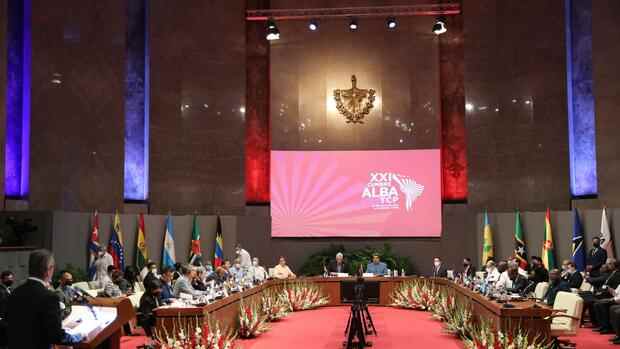The heads of state of the Bolivarian Alliance for the Peoples of Our America · Peoples’ Trade Agreement (ALBA) at the organization’s summit. Some of them don’t want to attend the Americas Summit with Biden, some aren’t invited.
(Photo: Zurimac Campos/Presidencia Venezuela/dpa)
Three deputy secretaries of state from the US State Department have visited Brazil in recent weeks – for the first time since President Joe Biden took office. Top US officials wanted to persuade Brazil’s President Jair Bolsonaro to attend this week’s “summit of the Americas.” For the first time since 1994, Washington will host an America Summit in Los Angeles. But Latin American governments are giving Washington the cold shoulder.
Mexico’s president is not coming because the dictators in Nicaragua, Venezuela and Cuba have not received any invitations. Other states in the Caribbean and South America have canceled. Bolsonaro now wants to appear after much persuasion. But even that is not certain.
All of this is a painful setback for the USA: The leading world power is calling for a summit – and nobody is coming. We in Europe should take this as a warning sign. The same could happen to us soon. And that’s a worrying development in an increasingly polarized world.
We offer Latin America too little
Like the USA, we also offer Latin America too little: We have no new proposals or joint projects on the most pressing issues in the region – migration, trade, growing poverty and crime. The Latin Americans also registered that Europe and the USA hardly helped the region with vaccine deliveries during the pandemic – in contrast to Russia and China.
Top jobs of the day
Find the best jobs now and
be notified by email.
Latin American governments are currently feeling their geopolitical revaluation as a result of the Ukraine crisis. Commodity exporters such as Argentina, Brazil, Chile and Peru are benefiting from rising prices for food and industrial commodities such as metals and ores. Oil producers like Mexico, Venezuela, Ecuador and Colombia are also getting more money for their oil and gas.
>> Read also: The America Summit in Los Angeles turns into a PR fiasco for the USA. Boycott over Biden’s invitation policy
In addition, the global energy transition benefits South America. In a few years, the states can become important suppliers of green hydrogen – as a replacement for oil, coal and natural gas. They also produce important raw materials such as lithium or copper, which are crucial raw materials for electric mobility batteries.
Latin America’s geopolitical weight is likely to grow in a polarized world: each of the power blocs – the US, China, Russia, the EU – will try to win over the region, or at least its largest states, as partners. The US and Europe should not be too sure that they will be the preferred allies.
20 Latin American countries are part of China’s New Silk Road
For example, some Latin American countries are abstaining from sanctions against Russia or implementing them only half-heartedly. Shortly before the war in Ukraine, the presidents of Brazil and Argentina visited the already isolated Russian president Vladimir Putin and expressed their solidarity with him.
China, on the other hand, has just won Argentina as a new partner in the Silk Road project. Argentina is the 20th Latin American country to join China’s Belt and Road Initiative (BRI). To this end, China wants to invest 23 billion dollars in local infrastructure in the coming years. Among other things, also in the fourth nuclear power plant of Pampa country.
For China, the partnerships with large countries in the traditional sphere of influence of the USA are diplomatic successes. Beijing is putting pressure on the American government.
And Europe, too, will have to adjust to Latin America’s growing indifference. Berlin, Paris and Brussels like to criticize the shortcomings of the democracies and the lack of environmental standards in Latin America – while they are much less bothered by other countries with which they work closely economically.
More: “Woke-mob” or new enlightenment? How political correctness became a US election campaign issue
